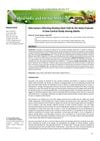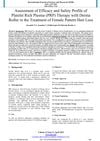 6 citations,
June 2018 in “PLOS ONE”
6 citations,
June 2018 in “PLOS ONE” The Alopecia Areata Assessment Tool (ALTO) effectively identifies alopecia areata from other hair loss types but needs more validation.
 4 citations,
March 2020 in “BMC Research Notes”
4 citations,
March 2020 in “BMC Research Notes” Skin tags in obese individuals may indicate higher cardiovascular risk.
 4 citations,
January 2019 in “Clinical Chemistry”
4 citations,
January 2019 in “Clinical Chemistry” Diagnosing Polycystic Ovary Syndrome is hard due to varying symptoms, no set criteria, and the need for better tests and education.
 2 citations,
February 2021 in “International Journal of Environmental Research and Public Health”
2 citations,
February 2021 in “International Journal of Environmental Research and Public Health” Women with PCOS tend to be less optimistic than those without it.
 2 citations,
January 2018 in “Biology and medicine”
2 citations,
January 2018 in “Biology and medicine” High testosterone levels in 20% of the women studied may indicate PCOS, while 80% had low levels with potential health impacts.
 2 citations,
April 2017 in “European Urology”
2 citations,
April 2017 in “European Urology” Using finasteride for hair loss or prostate issues does not significantly raise the risk of erectile dysfunction.

Women with PCOS are at higher risk for gum disease, and managing shared risk factors can help both conditions.
 June 2023 in “Journal of Ayurvedic and Herbal Medicine”
June 2023 in “Journal of Ayurvedic and Herbal Medicine” Age, stress, and anger increase the risk of hair fall.
 April 2023 in “International journal of science and research”
April 2023 in “International journal of science and research” PRP therapy with a derma roller is a safe and effective treatment for female hair loss.
 November 2022 in “SAS journal of medicine”
November 2022 in “SAS journal of medicine” There's no link between low iron levels and the hair loss condition, alopecia areata.
 March 2021 in “Research Square (Research Square)”
March 2021 in “Research Square (Research Square)” Patients with RASopathies have a higher risk of autoimmune disorders and should be routinely screened.
 January 2021 in “Journal of Scientific Research of the Banaras Hindu University”
January 2021 in “Journal of Scientific Research of the Banaras Hindu University” Lifestyle changes and medical treatment can help manage PCOS symptoms in young adults.
 January 2019 in “Elsevier eBooks”
January 2019 in “Elsevier eBooks” Early detection and skin biopsies are crucial for treating skin cancer and diagnosing various skin conditions.
 June 2003 in “Obstetrical & Gynecological Survey”
June 2003 in “Obstetrical & Gynecological Survey” After chemotherapy for a gestational trophoblastic tumor, normal pregnancy rates are possible, but there's a slightly higher risk of the tumor reoccurring in future pregnancies.
 June 1995 in “International Journal of Gynecology & Obstetrics”
June 1995 in “International Journal of Gynecology & Obstetrics” Long-term use of oral contraceptives, especially starting before age 20, may increase the risk of early-onset breast cancer.
 September 2016 in “Journal of the Egyptian Women's Dermatologic Society (Print)”
September 2016 in “Journal of the Egyptian Women's Dermatologic Society (Print)” Higher RBP4 levels found in people with two types of hair loss.

Korean patients with androgenetic alopecia may have a higher risk of heart-related health issues and could benefit from early heart screening and healthier lifestyles.
 August 2015 in “Dermatologica Sinica”
August 2015 in “Dermatologica Sinica” Men with severe hair loss may have poorer sperm quality.
 February 2009 in “Journal of The American Academy of Dermatology”
February 2009 in “Journal of The American Academy of Dermatology” People with early-onset hair loss have higher risk of heart issues, so early screening is important.
 162 citations,
January 2015 in “Trends in Endocrinology and Metabolism”
162 citations,
January 2015 in “Trends in Endocrinology and Metabolism” Women with PCOS face higher risks of diabetes and heart disease, and these risks increase with obesity.
 74 citations,
June 2013 in “Journal of Investigative Dermatology”
74 citations,
June 2013 in “Journal of Investigative Dermatology” Four genetic risk spots found for hair loss, with WNT signaling involved and a link to curly hair.
 57 citations,
January 2004 in “Journal of Endocrinology”
57 citations,
January 2004 in “Journal of Endocrinology” Baldness caused by male hormones in female-to-male transsexuals doesn't increase the risk of heart disease.
 54 citations,
September 2019 in “Journal of the European Academy of Dermatology and Venereology”
54 citations,
September 2019 in “Journal of the European Academy of Dermatology and Venereology” Tofacitinib is somewhat effective for alopecia areata, but more research is needed on its safety and long-term effects.
 49 citations,
January 2004 in “Dermatology”
49 citations,
January 2004 in “Dermatology” Men with a family history of hair loss are more likely to experience it themselves, especially if both parents have hair loss.
 36 citations,
April 2017 in “journal of current ophthalmology”
36 citations,
April 2017 in “journal of current ophthalmology” Good preoperative assessment is crucial for safe and effective eyelid and brow cosmetic surgery.
 35 citations,
January 2014 in “Postepy Dermatologii I Alergologii”
35 citations,
January 2014 in “Postepy Dermatologii I Alergologii” DHT's role in hair loss is important, but measuring its level for diagnosis is questionable.
 32 citations,
April 2016 in “Journal of Obstetrics and Gynaecology Research”
32 citations,
April 2016 in “Journal of Obstetrics and Gynaecology Research” Women with severe types of PCOS are more likely to have metabolic syndrome, and belly fat is a key predictor of this risk.
 31 citations,
November 2014 in “Journal of Endocrinological Investigation”
31 citations,
November 2014 in “Journal of Endocrinological Investigation” Women with androgen excess, especially those with PCOS, have a much higher risk of heart disease and stroke.
 13 citations,
November 2015 in “Blood Pressure”
13 citations,
November 2015 in “Blood Pressure” Hair loss may indicate higher heart risk and metabolic issues.
 10 citations,
July 2015 in “Journal of Cosmetic Dermatology”
10 citations,
July 2015 in “Journal of Cosmetic Dermatology” Higher DKK-1 levels found in hair loss patients; L-ascorbic acid 2-phosphate, L-threonate, and ginsenoside F2 may help promote hair growth.






























